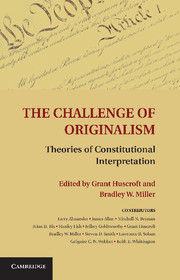Book contents
- Frontmatter
- Contents
- Preface
- Contributors
- The Challenge of Originalism: Theories of Constitutional Interpretation
- Part One Exposition and Defense
- 1 What Is Originalism? The Evolution of Contemporary Originalist Theory
- 2 The Case for Originalism
- 3 On Pluralism within Originalism
- Part Two Interpretation and Intention
- Part Three Originalism and Constitutional Settlement
- Part Four Challenges and Critiques
- Index
- References
3 - On Pluralism within Originalism
from Part One - Exposition and Defense
Published online by Cambridge University Press: 07 October 2011
- Frontmatter
- Contents
- Preface
- Contributors
- The Challenge of Originalism: Theories of Constitutional Interpretation
- Part One Exposition and Defense
- 1 What Is Originalism? The Evolution of Contemporary Originalist Theory
- 2 The Case for Originalism
- 3 On Pluralism within Originalism
- Part Two Interpretation and Intention
- Part Three Originalism and Constitutional Settlement
- Part Four Challenges and Critiques
- Index
- References
Summary
A lot of thought and debate goes into the drafting of a constitution. Fundamental interests of society are affected by the choices made about constitutional design and constitutional language. Political opportunities are created or foreclosed by constitutional choices. Values, interests, and groups are recognized, valorized, neglected, or worse. Whether the process of creating a constitution is relatively open and participatory or relatively closed and elitist, the stakes are high and the process of constitution making is a deliberate one.
But after constitutions are drafted, they must be put into practice. No matter how carefully and thoughtfully crafted at their origins, constitutions must still be interpreted and implemented over time to remain effective and relevant. Disputes over constitutional meaning quickly arise under every constitution, and new problems emerge that challenge the ingenuity of those who seek to adhere to pre-existing constitutional commitments and to operate within an established constitutional framework. The constitutional project does not end with a moment of founding. A successful constitutional enterprise requires ongoing efforts at constitutional maintenance, and sometimes significant revision.
- Type
- Chapter
- Information
- The Challenge of OriginalismTheories of Constitutional Interpretation, pp. 70 - 86Publisher: Cambridge University PressPrint publication year: 2011
References
- 3
- Cited by



